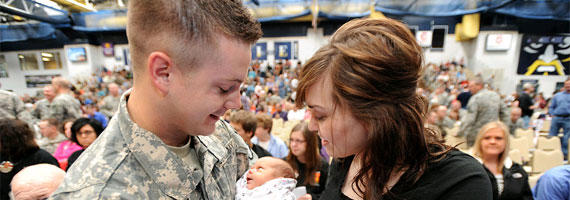An Army spouse blogger in Vermont has gotten the military blogging community in a hot tizzy after writing a post stating that, her in opinion, Army National Guardsmen are not “by any stretch of the imagination” really Soldiers, and Army National Guard wives are not really Army wives.
Her reasoning, in a nut shell, is this: Active Duty Soldiers deploy, come home, put back on their uniforms, return to an Active Duty life. But National Guardsmen come home, take off their uniforms, go back to civilian life. Yes, they drill on a regular schedule, but that doesn’t make them day in and out Soldiers. Yes, Guardsmen suffer from PTSD issues … but so do a lot of civilians from a lot of non-combat related issues.
And if Guardsmen aren't really Soldiers, their spouses aren’t Army wives, she says.
Feb. 10 Update: The commander of her husband, who she refers to as "Hubs," has issued a public apology for "Hub's" comment in defense of his wife's position. Go here for all the details.
Her husband, who she married in August (according to her blog), has deployed twice in the past and is currently a recruiter based out of Vermont. It is the Vermont National Guard spouses, in particular, that she is taking issue with. She indicates that she is in the dark as to why Guard spouses get so upset about this characterization. In her words: "When you try to explain this to a Guard spouse, they get defensive, and often times throw a huge fit. "
From the post:
The Vermont National Guard is just that, they are State Militia. The Hubs is a federal soldier. The National Guard spouses around here like to refer to themselves as 'Army Wives'. They aren't. I respect their significant others for the things that they do, but they are not, by any stretch of the imagination, soldiers.
And:
I agree, your husband got deployed, just like mine, but when he came home, he knew he wouldn't get deployed again for at least another four years, in which time he probably wouldn't have re-upped his contract. When my husband got home, he knew he could turn around and get deployed again. Period.
She also accuses Army Guard spouses of a series of Army wife “rule” infractions, including disgracing their husbands’ uniforms by taking “sexy” photos in them, failing to respect higher ranking Guardsmen by not dressing up when they meet them or using “proper” greetings, and participating in public affection displays while their husband is in uniform.
Go read the entirety of AirborneWife814’s post over at her blog “Army Wife, Army Life” for yourself. Don’t bother to try commenting there -- given the amount of drama her statements have caused, she was smart to close her comments.
Update: After making major edits to her statements Feb. 10, the author appears to have completely killed her blog site.
We don’t know much about this blogger’s background, but I see from her blog that she has only been married to her spouse since August. She does not live on or near an Active Duty base. She probably does not associate with Active Duty spouses very often. Unless it was as a girlfriend, she did not face deployment with her now spouse.
While I truly do respect her right to write whatever she wants on her own blog (FirstAmendment, all the way!), I, like most of the spouse community talking about this on Facebook, disagree with her statements. And here’s why – point by point:
She says: Guardsmen and their spouses are not really “Soldiers” and “Army wives” because they return to civilian life when they get home from deployment, and, when they return, won’t deploy for another four years.
I say: Wrong – or at least partially. While the stated DoD policy is that they only deploy once every four years, often specialty companies or those with high demand skill sets within a given Guard unit will deploy alone. And if a Guardsmen switches to another unit within the same state or elsewhere for promotion opportunities, for example, he will deploy with their new unit before that four year window is up.
In short, just like the “stated policy” for active duty units is currently a nine-month deployment to two years at home, there are always lots of exceptions.
She says: Guardsmen only go to drill one weekend a month, two weekends a year. Therefore they are not full time Soldiers and, therefore, their spouses are not really “Army wives.”
I say: Wrong again. This used to be the case for Guard units, back in the old days when no one was supporting missions in Afghanistan and Iraq. Since that time units have been mobilized for up to 24 months at a time, requiring a far greater time commitment to training than this “two weekends a year” business.
She says: So what if Guardsmen get PTSD? So do a lot of civilians for non-combat related issues.
I say: Huh? She’s right – PTSD is a problem associated with a lot of traumatic events. But she’s missing the point of the injury – it’s not the PTSD that’s deserving of respect, it’s how it was acquired. The spouses of wounded warriors whose “only” injury is severe mental or psychological trauma will tell you that their lives are altered thanks to service of their country in ways that may far exceed most physical injuries.
And I continue to feel: What is most distasteful about her points is that they demonstrate a complete lack of understanding or ignorance of the lifestyle and potential hardships the spouses of Guardsmen must face.
For example, as an Active Duty spouse myself, I am grateful for the level of predictability I have knowing that my husband will deploy, and likely in a fairly regular pattern. Guard spouses don’t have that benefit. Instead they get to balance between two worlds – civilian and Army – and wake-up one morning to learn that their husband has to leave his safe job at the bank, yet again, for time downrange. At least I know that my husband will definitely deploy again, and probably soon.
Guard (and Reserve) spouses face the same lack of support and benefits shared by those active duty spouses who decide to move home, far away from bases, during deployments – only theirs' is achieved by staying where they started, not by going somewhere new. All the things that I rely on to get my through a deployment with a shred of sanity, like camaraderie with other deployed spouses, childcare support on base and those fantastic, sponsored nights out, are by and large not available to the Guard. And many Guard wives live not only far away from bases where those amenities would be available, but far away from other Guard spouses who can understand their pain.
I wouldn’t say Guard spouses have it better than Active duty ones – but I know that we at the very least are on equal footing in this thing.
As for her list of reasons Guard wives are less respectful than active duty spouses, let me leave it at this: clearly she has not spent a lot of time around active duty spouses, or she would realize that all of these are common “infractions” in every military community, active duty Army or otherwise.
Conclusion: Sometimes spouses do dumb things, and sometimes those things make them look disrespectful or clueless to both the weight of military service and the burden of the home front. I’d call the post that sparked this discussion “case in point."










